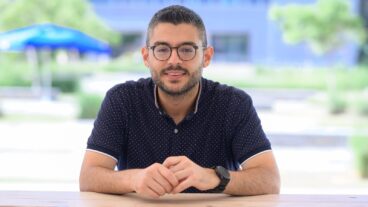Zohar Sharon: “I have a sniper’s sense of direction. With golf, it’s a matter of training and iron will. I live on this golf course. It’s my life.”Just over two and a half years ago, Zohar Sharon barely knew the names of legendary golfers like Jack Nicklaus or Tiger Woods.
Today, he himself is a national and world champion golfer. That, in itself, is a remarkable achievement for a 50-year-old man who had never previously set foot on a fairway. But, if you take into consideration the fact that Sharon is blind – his achievements take on gargantuan proportions.
Twenty-five years ago, Sharon was a normally active young man who earned his living as an explosives expert with the Israeli Defense Forces. On one fateful mission a bomb he was attempting to defuse blew up in his face and he immediately lost sight in one eye. The other eye was also damaged and two years later he was totally blind. At the time he devastated.
“There were junctures in my life when I thought of committing suicide,” Sharon told ISRAEL21c, sitting at the café of the Caeserea Golf Club. “I had some desperate moments.”
Spending even just an hour or so with this seemingly eternally optimistic, beaming man it is hard to believe he has ever been anything but exuberantly happy. He is also a highly driven individual. These days he spends up to ten hours daily on the fairways and greens at Caeserea, honing his swinging and putting skills. He appears to be making commensurate progress.
Three months ago he was one half of the winning team at the Israeli National Pairs Golf Championships – for seeing golfers – and just over a month ago he won the World Blind Golf Championship in Scotland.
So, how does he do it? Surely, he is at a distinct disadvantage competing with other golfers who can, at least, see the topographical conditions they have to negotiate in order to get their ball to the green. As far as Sharon is concerned, it all boils down to work, work and more work. “You’ve just got be dedicated. That’s all. You’ve got to put the hours in.”
Sharon adds that the skills he learned before his accident, as a sniper, now come in very handy too. “I was a very good sniper, and I even won a few championships. I have a sniper’s sense of direction. With golf, it’s a matter of training and iron will. I live on this golf course. It’s my life.”
Even with Sharon’s supreme confidence it is hard to understand exactly how he directs his shots, how he circumnavigates trees or shoots the ball across ponds without landing in the water.
“My caddy Shimshon Levy is my navigator. He tells me how far away the green is, and describes the lay of the land.” There are, however, some conditions Sharon can work out for himself, such as wind speed and direction. “Sometimes I can sense air movement better than Shimshon. But, we’re really like a married couple. If either of us comes to the golf course in a bad mood that can effect the way I play. Sometimes Shimshon recommends the wrong club, but that’s OK. On a bad day we just try to minimize the damage, on a good day we go for the record.”
While he says he had long periods of relative inactivity, Sharon has had other preoccupations. For a while he immersed himself in painting and, by all accounts, he became pretty good at that too. However, it almost led him to an abyss.
“It almost killed me,” he recalls. “I became totally absorbed in my painting. I’d spend days upon days in my studio, shut away from my wife and children.”
His labors bore artistic fruit and attracted considerable attention from art dealers and exhibition curators both in Israel and abroad.
“I received offers from people in Canada and I left my beautiful family and went there. I exhibited all over the place, sold lots of paintings and began giving lectures. I was just a simple painter and people started treating me like some sort of guru.”
At some stage Sharon’s strong survival instinct kicked in. “I was invited to cocktail parties, and met dealers, artists and rich business people. I started wondering if they were all as happy as they professed to be. And if they were, why were they all knocking back so much booze? I decided all this painting stuff wasn’t for me.”
It took a while for Sharon to find another pursuit but, as with his painting endeavors, when he did he put his all into it. How exactly did he get into golfing? “Someone came to the house one day and saw I was just sitting around doing nothing,” Sharon recalls. “He suggested I try a bit of home putting and he got me a putter and made a hole in a shoe box.”
Suitably taken with his new-found sport Sharon was soon holing-in-one from a distance of 5 meters. “I didn’t have much else to do. I’m not a womanizer and my kids didn’t live with me then (he was divorced by that time.) So I played all day and all night.”
A few months later a friend saw him in action and put him in touch with Caeserea Golf Club manager Alon Ben David. Sharon soon start practicing on grass rather than floor tiles but he found the going tough, and not just for logistical reasons.
“I didn’t really get on with any of the caddies they gave me, until I met Shimson Levy. Shimson was ready to put his ego to one side to help me. You can’t have too many bosses on the golf course.”
The rest, as they say, is history.
Sharon recently added another award to his increasingly crowded trophy cabinet when he was named Sports Personality of the Year in Israel, eclipsing the likes of men’s doubles tennis stars Andy Ram & Jonathan Erlich – who made it all the way to the semi-finals at this year’s Wimbledon tennis championships. Unassuming as he is effusive, Sharon says he didn’t expect to win at all.
“I didn’t take the whole idea of being a nominee for Sports Personality of the Year seriously. I was amazed when I was chosen. How much interest is there in golf in this country? But, they must have liked me, as a person.”
While that may sound akin to unmitigated hubris, Sharon insists he keeps a tight handle on his ego. “I learned a long time ago, never let your successes and the kudos go to your head. If you start thinking ‘me, me, me’ you lose it. Before you know it, someone else will have taken your place and you’ll just be yesterday’s news. I don’t want to fall.”
The champion golfer adds he had a hard time being related to as physically disabled. “When I painted, people used to call me ‘the blind painter’. I found that embarrassing. One day, someone said to me: ‘But you are blind. That’s a fact.’ That really brought it home to me. I had to be just who and what I was, and not try to be something else. If you see someone with a limp you can’t say he doesn’t have a physical problem. Just be yourself.”












